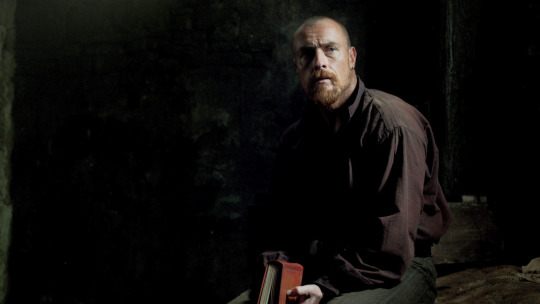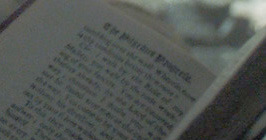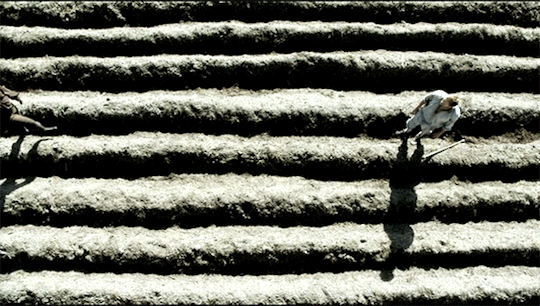#so like. did my day get entirely derailed by reading Part I of The Pilgrim's Progress in its entirety 100% for the purpose of making sure
Text
“Red book cover, red book cover.”
You know the book that Flint’s reading in the fort cell in 4x05? The red one that resembles his beloved copy of Meditations? This one?

It’s not Meditations. It’s The Pilgrim’s Progress…


… which, for anyone unaware, is a famous Christian allegory written by Puritan preacher John Bunyan in the 1600s, which sets out a prescription for how one ought to seek and attain salvation from a Puritan perspective (the only correct one according to them).
It stands in complete opposition to Thomas’ “know no shame” inscription in Meditations, encouraging its readers to feel ashamed about everything they do that might divert them from the straight and narrow. It also opposes Miranda’s assertion that “true love shouldn’t require suffering,” being very much on the “the truest form of love, love through suffering,” side of things.
Which brings us to Flint. According to Miranda in 2x05, Flint’s being driven to fight against England is, in part, a result of his shame. She perceives this shame to be that which Civilization’s judgements have burdened him with but Flint himself suggests that his shame is also the result of guilt over having not tried to save Thomas when he had the chance.
This is interesting because, though I do believe that Flint has largely made peace with himself by season four and has found a greater cause to fight for overall (which are not insignificant things, I want to be clear), it’s also true that he says to Silver in 4x04: “I think if [Thomas] knew how close we were to the victory he gave his life to achieve, he wouldn't want me to [give it up],” suggesting that Thomas’ death is still hanging over him in a way that’s honestly not that dissimilar to how he started out. There’s still a shame-based aspect to his desire to fight in the sense of “I can’t give up this war because Thomas (and now Miranda too) died for this.”
All of this could easily be said to parallel the protagonist of The Pilgrim’s Progress being driven to undertake a perilous journey in order to rid himself of his burden of shame and finally find peace at the end of it all.
According to the Puritan teachings espoused in the book, believing that you are inherently unclean and sinful is paramount to your salvation so, in other words, shame is good and necessary. As I said, this is the complete opposite of the Hamiltons’ beliefs, but it aligns pretty well with the ideas that Oglethorpe professes at the beginning of 4x10 about how “human debris” such as Thomas and Flint are “anathema to the Empire” and how they “must cease to be… to be able to find peace.”
Plenty of people have pointed out that Oglethorpe’s prison plantation can be viewed as a metaphorical afterlife which Flint enters into at the end of the show (through a gate even, just like the entrance into Heaven), but I’d also like to highlight his having to walk down a literal straight and narrow path—again, like the protagonist of The Pilgrim’s Progress—in order to finally reunite with Thomas.

So, with all that being said, the message behind Flint reading this particular book in 4x05 seems twofold to me:
1. Despite doing his best to follow Thomas and Miranda’s example and cast off his shame, shame is still something that Flint is very much burdened by and which still influences his desire to fight against England, even into season four.
2. Silver’s orchestrating Flint’s being sent to the plantation in Savannah and reunited with Thomas aligns with the “happy ending” of The Pilgrim’s Progress, freeing him from his shame and allowing him to find the peace he sought at last. And yet, with the plantation itself being upheld by shame, by the idea that men like Thomas and Flint deserve to be cast out of Civilization, is this really the kind of ““peace”” that Flint wanted for himself? Can imprisoning him for life in such a place truly be said to be “freeing” him from anything?
By having this particular copy of The Pilgrim’s Progress superficially resemble Meditations despite it being a book whose values are entirely opposite from Thomas’ core tenant “know no shame,” the show presents us with a “fruit, fruit. tits, tits.” commentary on its own ending: Silver’s solution might look like a happy ending for Flint at first glance, but, in reality, it promotes shame rather than eliminating it.
#black sails#james flint#i am. VERY excited about this#i have no idea if i'm the first one to point this out but i'd never heard anyone else say it before#and i wasn't even in the episode for this... i just happened to be scrolling around looking for a couple of other scenes and i was like#'hang on a second - can i read that title?'#and then i COULD!!!!!!#and at first i wasn't entirely sure what i had stumbled upon because i knew literally nothing about this book#but the wikipedia description made me INSANE#so like. did my day get entirely derailed by reading Part I of The Pilgrim's Progress in its entirety 100% for the purpose of making sure#i knew what i was talking about in this post?#*PERHAPS.*#it was. A Lot.#but worth it for this post!#the writers were insane for including this TINY detail that's literally only noticeable if you pause on one specific frame#and even then probably only if you have the blu-rays for the image quality (bc even then - it's barely readable as you can see)#but have it mean SO MUCH thematically!!#and of course - this is only my interpretation#i'd love if other folks wanted to take a crack at it also - particularly if they know more about this stuff than i do#i read the book (or the first part of it anyway - which seemed most relevant and is the part Flint is reading) and skimmed some wiki pages#but i am in no way claiming to be an expert on the text or John Bunyan or Puritanism or any of that#so i welcome any and all Thoughts that folks may have!
493 notes
·
View notes